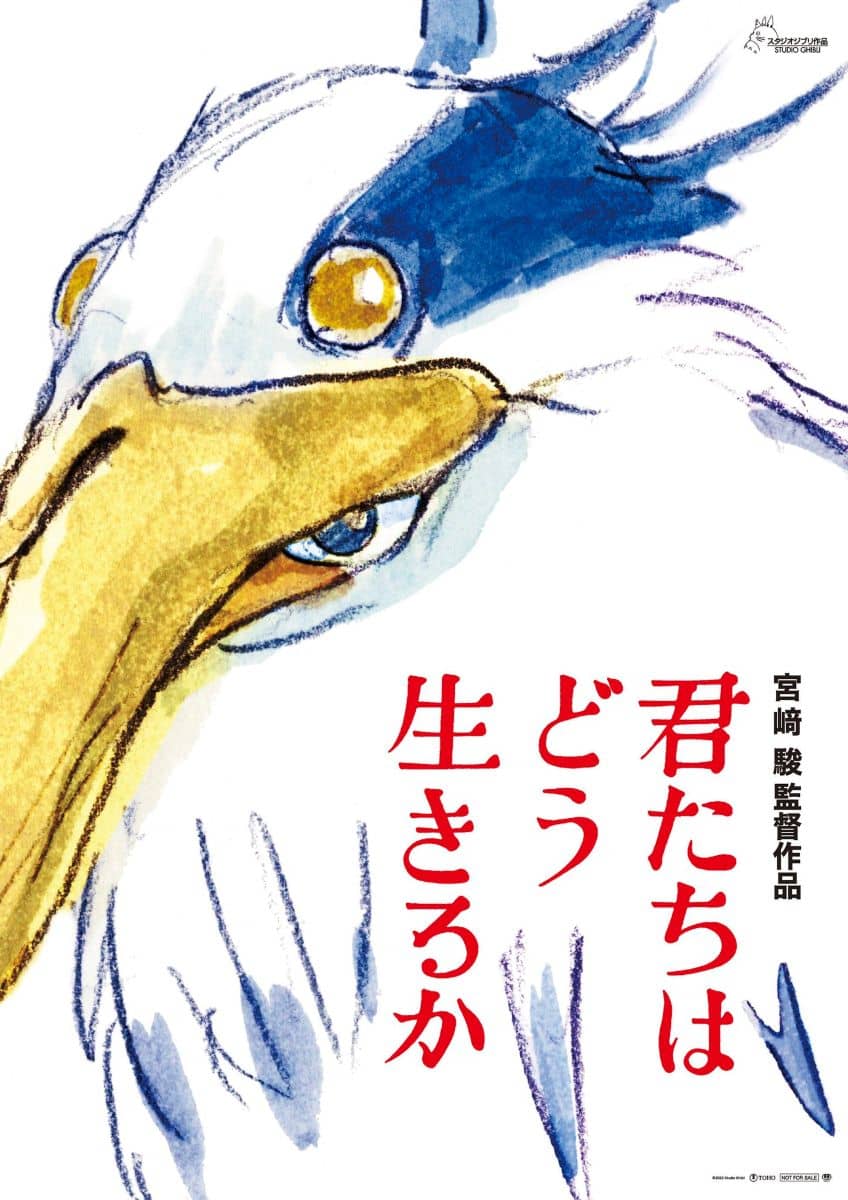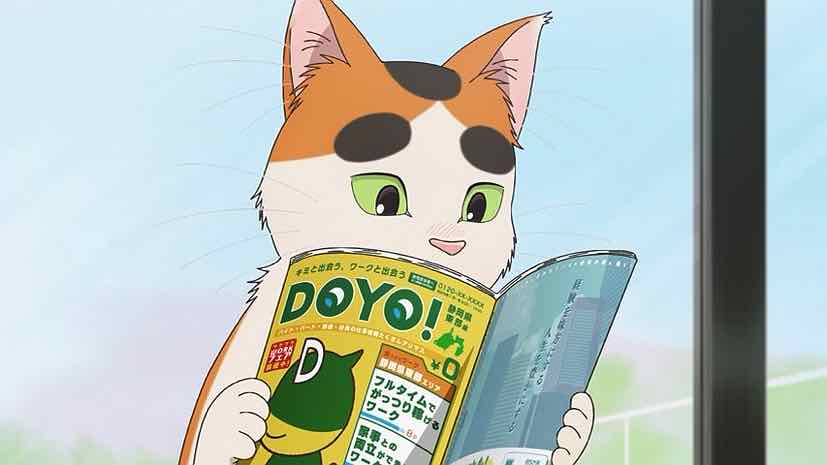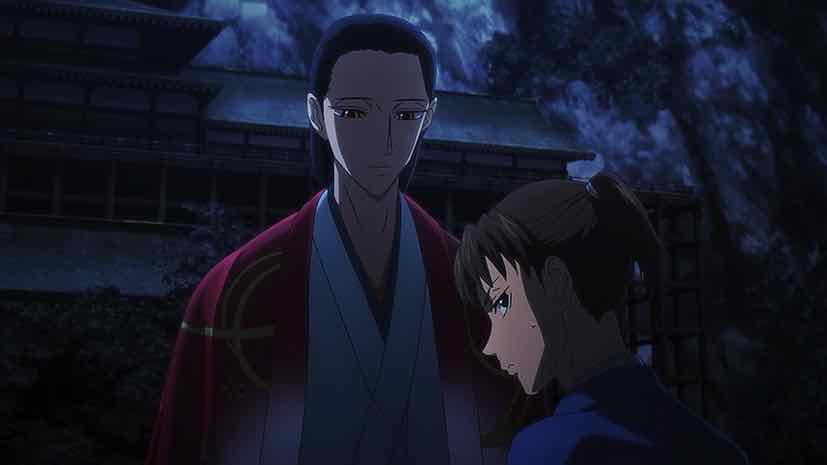As longtime readers of LiA will know, my policy is not to “review” movies (or any anime) that I’ve only watched raw. Certainly my comprehension level has improved over the years, but I still feel on some level as if I’m not doing the material justice by analyzing it with an incomplete understanding of its content. My plan is to follow that practice with Miyazaki Hayao’s How Do You Live (Kimitachi wa Dou Ikiru ka). But given the genuinely historic and possibly unique circumstances surrounding this film, I thought I’d at least drop a few more or less instant reactions.
Those unique circumstances are in part the fact that Studio Ghibli effectively released the movie as a complete mystery. There were no trailers, so synopses, no informational press releases (none of which prevented the film from very strong initial box office numbers). There wasn’t even any promo material apart from the gorgeous poster drawn by studio president Suzuki Toshio (who’s done many posters for the studio over the years, and is a wonderful artist). The movie shares a title with a 1937 novel Miyazaki admires, but – after the book had been reprinted twice in anticipation of a rush in sales – Suzuki announced that there was no connection between the two apart from the title.
Having seen it now, I would argue (as I suspected would be the case) that’s not quite true. But I feel as if I ought not to say more than that, because if anyone out there has a chance to actually see the film completely unspoiled – virtually unheard of with any blockbuster these days – I don’t want it on me that they can’t. I’ll just say it’s about a boy and a heron (the film’s rather unimaginative English title), and that in my view it has a very strong feel of autobiography to it. Of course I said the same after The Wind Rises, but the one does not preclude the other.
The shadow of Kaze Tachinu does cast itself over How Do You Live, so a few words about that film are probably necessary here. I wrote a lot about the criticisms which fell on it in my review, and to wit I acknowledge pretty much all of them. Yet I still feel as if the film is a masterpiece in its way, and I do genuinely believe Miyazaki believed it was his final movie when he was making it. Whether he believed that about all the other final movies he announced I don’t know, but The Wind Rises is an extraordinarily introspective work despite overtly being a biography of someone else (airplane designer Horikoshi Jirou).
Well, How Do You Live is too – but in a totally different way. My sense with “Rises” is that Miyazaki was looking back on his career – with this film, it seems more as if it’s his life itself. Suzuki – who almost certainly understands Miyazaki the artist better than anyone else – has said that How Do You Live is a sort of letter from Miyazaki to his grandson, something to leave behind after he leaves this world, to help him understand the meaning of death and how to process it as someone who lives on. I have no reason to doubt Suzuki – if anyone would know, he would. Still, I find this movie to be much more difficult to interpret in terms of intent than Kaze Tachinu.
As a cinematic work, it’s certainly solidly within the Ghibli and Miyazaki canon. I don’t think you’d ever mistake it for the work of anyone else. It’s incredibly beautiful of course, and succeeds most gloriously as an expression of pure imagination. Miyazaki’s vision – in multiple senses – is truly staggering. My feeling (especially without subtitles) was of watching the director’s dreams being brought to life on screen. I think it’s his most abstract work, and probably his most opaque. Different viewers will take different meanings from it, and I’m reserving judgment to an extent until I’ve seen it with subs.
As to whether this actually will be the master’s final film, I think things are different this time. Miyazaki is 82 now, and the gap between features has been growing ever-longer. You can’t produce animation on this level with shortcuts and CGI – this is a monumental effort that starts with the man himself. Realistically I don’t think we can expect him to undertake that again. And it must be said, there were times while watching How Do You Live when my overriding emotion was a wish that Miyazaki could live forever, so we’d never have to be deprived of his imagination and vision – there’s never been anyone else like him in anime or animation. But that’s not how it works, of course – which, as much as anything, may be the essential message of what’s likely his final film.





Raikou
July 19, 2023 at 4:56 pmI’m just hoping my country would release it this year.
We’re not that much lucky to get release of Ghibli movies on general box office.
Yann
July 20, 2023 at 12:47 amAs far as I’m concerned, this is the perfect (non)review to a Miyazaki movie with no trailers… Thank you. 🙂
Guardian Enzo
July 20, 2023 at 7:50 amWow, thank you!
Jeb Nemo
July 24, 2023 at 2:13 amAbstract and opaque, neither is a drawback when it comes to great art.
Guardian Enzo
July 24, 2023 at 8:28 amI don’t believe I suggested they were!
Snowball
January 3, 2024 at 3:13 amI just watched this at the cinema last weekend and I have to say I couldn’t really make heads or tails out of it, but it feels deeply personal to Miyazaki’s life and experiences. He’s a master of his craft for sure.
Guardian Enzo
January 3, 2024 at 7:25 amYour two statements are totally contradictory yet I totally understand what you mean. And that’s Miyazaki.
Snowball
January 3, 2024 at 8:04 amWell, I do mean it as a positive, because, coincidentally, I also had the chance to watch Shinkai’s two most recent films. While I can’t fully grasp the meaning of ‘The Boy and the Heron’, I was fully engaged from start to finish, whereas, during the two Shinkai films (even though the narrative was a lot more linear) I was thinking I would be better off rewatching an episode of Pluto for the umpteenth time. The levels in narrative crafting is just as different as night and day where fantasy is concerned at least.
Nadavu
February 5, 2024 at 8:09 pmSaw it last night. Just before the first scene a warning came in Hebrew: The siren you are about to hear is part of the movie. Then the movie started with a wailing siren and everyone in the theater (all 6-7 couples) burst out laughing, because we were all terrified on a level that logic couldn’t calm.
As for the movie itself, I admit I was disappointed. The animation was superb, but length, balance and plot didn’t work for me. It’s funny that you wrote “I don’t think you’d ever mistake it for the work of anyone else”. I literally thought to myself, at one point, that had I was shown this movie without context I would have thought it was Shinkai doing another Ghibli impression, à la Hoshi wo Ou Kodomo.
And that’s it, really. What some call abstract feels to me like weak story-telling. I guess Howl is the extremity of abstractness that I can still relate to.
Panino Manino
February 23, 2024 at 10:39 pmWatched it yesterday, unexpectedly, in the cinema.
Very frustrating.
Of course, if you put some effort you can find a lot of “symbolism” and “metaphors” and other “beautiful things” there, but me, I want to deny any effort to finding anything of valor on that second half. Like I said, frustrating, the first half was so interesting, had some details that felt “unexpected” for a Hayao Miyazaki’ movie with that family situation, but them that movie ended and started a new one, a mini and pointless “Spirited Away”.
When that other movie finally ended and I thought the story would go back to the first movie, it just ended.
Anything and everything that was left to be developed was magically solved.
The characters that felt so interesting in the first half, that felt like a deviation of the typical Hayao’s characters, in the second half they transformed into those old boring model characters.
Very, very frustrating.
And I wasn’t the only only.
The whole room was reacting strongly to the first half and a lot of people left the session loudly complaining.